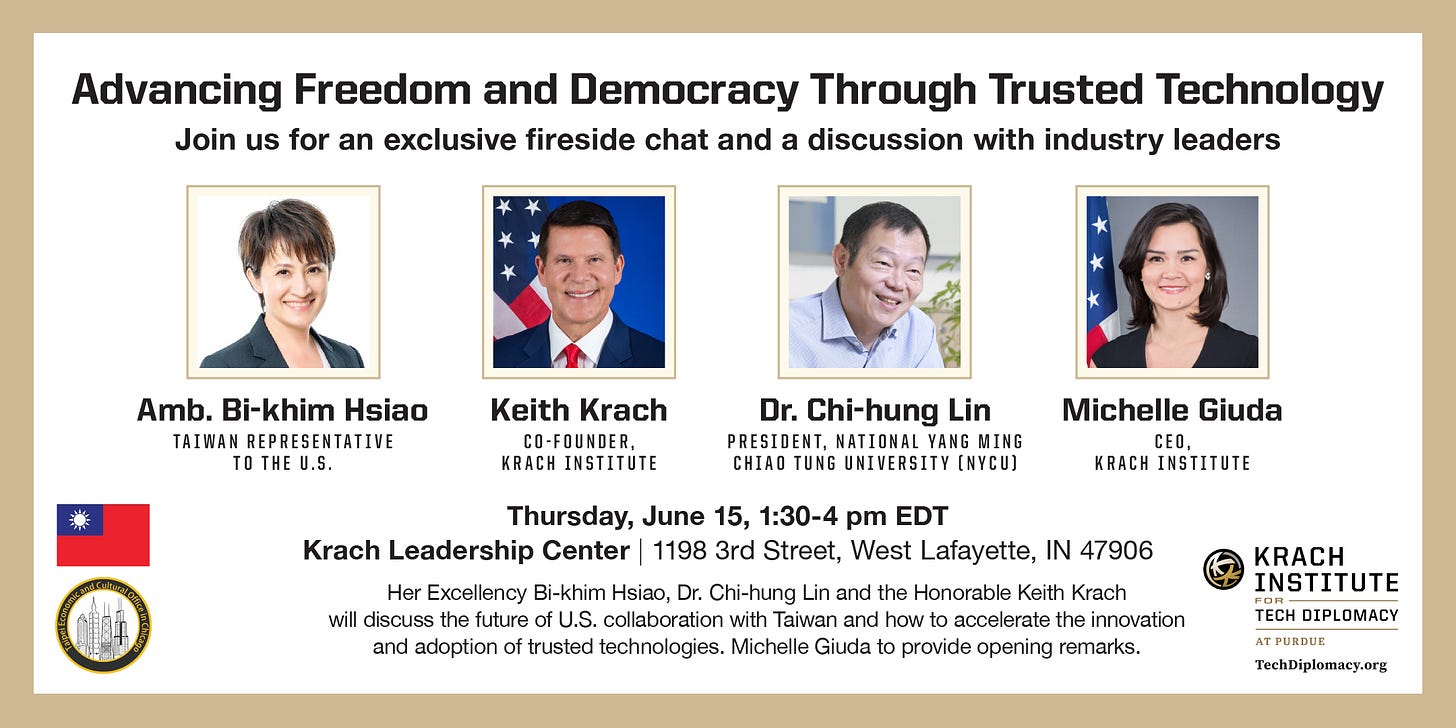Tech Diplomacy Now: Fourth US-EU Trade and Technology Council Meeting
The intersection of technology, foreign policy, and the news you need to know
TABLE OF CONTENTS
Top News of the Week
Announcements
Latest News
Technology Strategy and Policy
Artificial Intelligence
Telecommunications Networks and Infrastructure
Critical Minerals
Synthetic Biology
Quantum
Advanced Aerospace Technology
Semiconductors and Microelectronics
Energy and Climate
Opinion and Commentary
The Last Word
Top News of the Week – Fourth Ministerial Meeting of the U.S.-EU Trade and Technology Council
On May 30-31, the U.S. Secretaries of State and Commerce, along with the U.S. Trade Representative met with their European Union counterparts in Luleå, Sweden for the Trade and Technology Council (TTC). Presidents Biden and von der Leyen agreed to hold the TTC meetings at their first Summit in June 2021 and last week’s session was the fourth time these senior officials met to discuss technology diplomacy issues.
In terms of technology coordination, the leaders focused on Artificial Intelligence (collaboration on research and regulatory efforts), e-mobility standards to speed the adoption of electric vehicles, the prevention of a subsidy race around semiconductor manufacturing, and the establishment of a task force to explore collaboration on quantum technologies.
The leaders also focused on deepening their alignment on dual-use export controls and the prevention of leakage to Russia and Belarus. One must also assume that coordination for semiconductor export controls on China, as well as Chinese economic coercion, took up a significant chunk of the agenda. The TTC meeting comes just days after Commerce Secretary Raimondo met with her Chinese counterpart and told him that the U.S. “won’t tolerate” China’s ban on Micron’s memory chips.
Background reading:
U.S.-EU Summit Statement – June 15, 2023
The Systemic Partnership – Internationale Politik Quarterly, May 11, 2022
TTC Joint Roadmap for Trustworthy AI and Risk Management – December 1, 2022
The big problems you won’t hear about at the EU-US Trade and Technology Council – Atlantic Council, December 2, 2022
U.S.-EU Joint Statement of the Trade and Technology Council – May 31, 2023
Announcements
We’d like to invite you to a fireside chat with the Krach Institute for Tech Diplomacy at Purdue (KITDP) and Taiwan at Purdue University’s campus in West Lafayette, IN.
Her Excellency Bi-khim Hsiao, Dr. Chi-hung Lin and the Honorable Keith Krach will discuss the future of U.S. collaboration with Taiwan and how to accelerate the innovation and adoption of trusted technologies. KITDP CEO, Michelle Giuda, will provide opening and closing remarks. Following the fireside chat, an industry panel will also delve into how to securely advance emerging and disruptive technologies in both Taiwan and the U.S.
Date: Thursday, June 15, 2023
Fireside Chat & Industry Panel: 1:30-4:00 PM ET
Location: Krach Leadership Center, 1198 3rd Street West Lafayette, IN 47906 (live stream to be published once registered)
Click this link to register: https://lnkd.in/gYDUmRMw
Welcome, Strike Photonics, to the Krach Institute for Tech Diplomacy at Purdue as our newest corporate member.
Next-gen Strike Photonics chips are bringing transformative performance to mission-critical sectors like biotechnology, electronic defense and telecommunications. Strike Photonics’ world-changing computational innovation will help advance freedom through trusted technology, and we look forward to our partnership.
Latest News
China defence chief’s hard line on Taiwan ‘a message for the region’ – SCMP, June 2, 2023
U.S. and China Trade Barbs as Warships Have Close Encounter in Taiwan Strait – WSJ, June 4, 2023
U.S. Vows to Continue Patrols Near China and Urges Nuclear Talks – NYTs, June 3, 2023
Deep fake video of Putin declaring martial law is broadcast in parts of Russia – Semafor, June 5, 2023
A deep fake video depicting Russian President Vladimir Putin declaring martial law and warning that he would order a general mobilization briefly dominated televisions and radios in some of the country’s border cities Monday.
The broadcast, which also claimed there was an ongoing Ukrainian incursion into Russia, was aired in Belgorod, Voronezh, and Rostov, cities in close proximity to Ukraine’s border.
Technology Strategy and Policy
Fewer U.S. Companies Applied to Export Sensitive Technology to China Last Year – WSJ, May 31, 2023
We need to keep CEOs away from AI regulation – Financial Times, June 5, 2023
China urges Japan to halt export restrictions on chips – Reuters, May 28, 2023
G7 Gives First Definition to ‘Economic Security’ – CSIS, May 31, 2023
Artificial Intelligence
AI frenzy sweeps China as companies search for their own ChatGPT – Nikkei Asia, June 2, 2023
Japan Goes All In: Copyright Doesn’t Apply To AI Training – Technomancers.ai, May 30, 2023
Spotlight on Beijing Institute for General Artificial Intelligence – CSET, May 2023
Competition concerns in the age of AI – TechCrunch, June 2, 2023
Telecommunications Networks and Infrastructure
Former ByteDance Executive Claims Chinese Communist Party Accessed TikTok’s Hong Kong User Data – WSJ, June 5, 2023
Majority of EU countries against network fee levy on Big Tech, sources say – Reuters, June 3, 2023
Netherlands fears Chinese cyberattacks amid chips battle – Politico, May 31, 2023
Critical Minerals
Saudi Arabia expands lithium processing to supply BMW – Financial Times, June 1, 2023
Net zero needs at lot more critical metals – Australian Financial Review, June 6, 2023
Treasure Hunt: The first U.S. nationwide geological survey in a generation could reveal badly needed supplies of critical minerals – Science, June 1, 2023
Synthetic Biology
AstraZeneca defies geopolitics to bet on China – Financial Times, June 4, 2023
Enhanced rare-earth separation with a metal-sensitive lanmodulin dimer – Nature, May 31, 2023
Bacteria sort critical minerals better than humans: study – The Hill, May 31, 2023
Quantum
Quantum computers are better at guessing, new study demonstrates – Phys.Org, June 5, 2023
Quantum computers: what are they good for? – Nature, May 24, 2023
Advanced Aerospace Technology
China Crosses a Flying Milestone but Remains in the Boeing-Airbus Grip – NYTs, June 1, 2023
Growing hacking threat to satellite systems compels global push to secure outer space – Cyberscoop, June 1, 2023
A review of Japan’s space policy after the H3 launch vehicle failure – The Space Review, June 5, 2023
China launches a new crew into space, including its first civilian astronaut – Associated Press, May 30, 2023
Semiconductors and Microelectronics
Mapping the Semiconductor Supply Chain: The Critical Role of the Indo-Pacific Region – CSIS, May 30, 2023
The big question of how small chips can get – Financial Times, May 31, 2023
Chinese computer maker Powerleader says its CPU was developed ‘with the support of Intel’ – SCMP, June 2, 2023
How AI Is Catapulting Nvidia Toward the $1 Trillion Club – WSJ, May 26, 2023
Energy and Climate
VW Is on a Hunt for Resources to Remove China From Its EV Batteries – WSJ, June 4, 2023
The Other Green-Energy Grid Crisis – WSJ, June 4, 2023
China's EV Battery Sector Is Preparing a New Breakthrough – Bloomberg, June 5, 2023
Opinion and Commentary
TSMC's fate will indeed be at stake if China attacks Taiwan – Nikkei Asia, June 2, 2023
China’s Auto Export Wave Echoes Japan's in the ’70s – Niall Ferguson, Bloomberg, June 3, 2023
The next Chinese tech threat is already here – Charles Parton, The Spectator, May 29, 2023
Pursuing Strategic Competition: Relative Competitive Position Matters – Scott Kennedy, CSIS, May 31, 2023
The Last Word
How can the US and its partners compete with China and lead the world on AI development and global governance? The Global Tech Security Commission (GTSC) hosted an hour long webinar on the future of AI on Monday. During the discussion, honorary co-chair of the GTSC, Rep. Michael Waltz (R-Fla.), called for the creation of a House committee dedicated to AI. Watch the full webinar here:
About: Tech Diplomacy Now
The nonpartisan Krach Institute for Tech Diplomacy at Purdue is focused on securing freedom by accelerating the innovation and adoption of trusted technology.
The Institute is the preeminent global authority on Tech Diplomacy, integrating tech expertise, Silicon Valley strategies, and foreign policy tools to build the Global Tech Trust Network of governments, companies and individuals united around a set of shared trust principles and a common mission to ensure that technology advances freedom.





